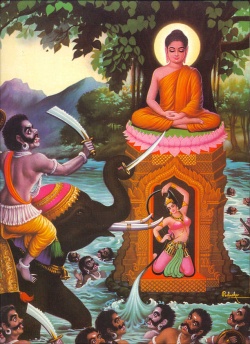Difference between revisions of "Māra-samyutta"
Jump to navigation
Jump to search
m (Text replacement - "Fear" to "{{Wiki|Fear}}") |
m (Text replacement - "Pride" to "{{Wiki|Pride}}") |
||
| Line 8: | Line 8: | ||
As the wind, a fallen cotton tuft. | As the wind, a fallen cotton tuft. | ||
| − | Some stories refer to the [[existence]] of Five Daughters, who represent the [[Three Poisons]], [[Attraction]], [[Aversion]] and [[Delusion]], accompanied additionally by | + | Some stories refer to the [[existence]] of Five Daughters, who represent the [[Three Poisons]], [[Attraction]], [[Aversion]] and [[Delusion]], accompanied additionally by {{Wiki|Pride}} and {{Wiki|Fear}}. |
[[Māra Samyutta]]. The fourth section of the [[Samyutta Nikāya]]. S.i.103 27. | [[Māra Samyutta]]. The fourth section of the [[Samyutta Nikāya]]. S.i.103 27. | ||
Latest revision as of 19:12, 12 September 2013
Samyutta Nikaya's Māra-saṃyutta,Mara's three daughters fail to entice the Buddha:
They had come to him glittering with beauty —
Taṇhā, Arati, and Rāga —
But the Teacher swept them away right there
As the wind, a fallen cotton tuft.
Some stories refer to the existence of Five Daughters, who represent the Three Poisons, Attraction, Aversion and Delusion, accompanied additionally by Pride and Fear.
Māra Samyutta. The fourth section of the Samyutta Nikāya. S.i.103 27.
